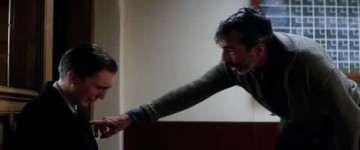Who: Amel Larrieux
What: Amel Larrieux: A Blissful Holiday
Where: City Winery, 155 Varick St., 212-608-0555
When: Friday, December 26, $24-$45, 8:00
Why: An activist, a self-described “urban chanteuse by birth,” and cofounder of Groove Theory, Amel Larrieux has released such solo records as Infinite Possibilities, Morning, and Ice Cream Everyday; “when i wrote ‘Danger’ for my latest project,” she recently blogged, “i truly did not expect i would be dedicating it to anyone so soon….”
twi-ny recommended events
THE SHOP AROUND THE CORNER
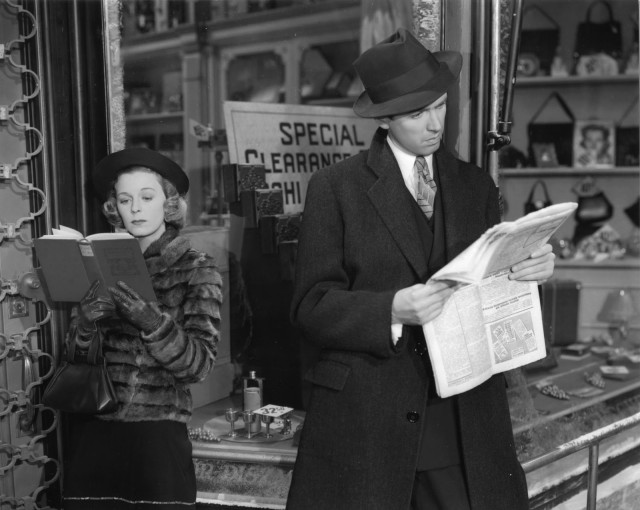
Klara Novak (Margaret Sullavan) and Alfred Kralik (James Stewart) have little time for each other in Ernst Lubitsch’s THE SHOP AROUND THE CORNER
THE SHOP AROUND THE CORNER (Ernst Lubitsch, 1940)
Film Forum
209 West Houston St.
December 25-31
212-727-8110
www.filmforum.org
 Jimmy Stewart’s most famous Christmas movie might be It’s a Wonderful Life, but that doesn’t mean it’s his best. That distinction belongs to the 1940 Ernst Lubitsch black-and-white romantic comedy The Shop Around the Corner, which is having a special holiday run December 25-31 at Film Forum. Stewart stars as Alfred Kralik, a serious-minded longtime clerk at the Budapest gift shop Matuschek & Co., serving as the right-hand man to owner Hugo Matuschek (The Wizard of Oz’s Frank Morgan), who relies on his star employee’s honesty and expertise. Also working at the store is Pirovitch (Felix Bressart), a timid family man who hides every time Mr. Matuschek asks for an opinion; the shy Flora Kaczek (Sara Haden); the brash, ambitious delivery boy Pepi Katona (William Tracy); and the self-involved would-be bon vivant Ferencz Vadas (Joseph Schildkraut). When Klara Novak (Margaret Sullavan) shows up looking for a job, Kralik tries to quickly dismiss her, but she ends up charming Mr. Matuschek and getting hired. She and Kralik, her direct superior, bicker constantly, each one hoping that a romantic pen pal will make their dreary lives much brighter, especially as Christmas approaches. But little do they know the love letters that they are so carefully crafting are actually to each other, their secretive literary relationship a far cry from their actual daily one.
Jimmy Stewart’s most famous Christmas movie might be It’s a Wonderful Life, but that doesn’t mean it’s his best. That distinction belongs to the 1940 Ernst Lubitsch black-and-white romantic comedy The Shop Around the Corner, which is having a special holiday run December 25-31 at Film Forum. Stewart stars as Alfred Kralik, a serious-minded longtime clerk at the Budapest gift shop Matuschek & Co., serving as the right-hand man to owner Hugo Matuschek (The Wizard of Oz’s Frank Morgan), who relies on his star employee’s honesty and expertise. Also working at the store is Pirovitch (Felix Bressart), a timid family man who hides every time Mr. Matuschek asks for an opinion; the shy Flora Kaczek (Sara Haden); the brash, ambitious delivery boy Pepi Katona (William Tracy); and the self-involved would-be bon vivant Ferencz Vadas (Joseph Schildkraut). When Klara Novak (Margaret Sullavan) shows up looking for a job, Kralik tries to quickly dismiss her, but she ends up charming Mr. Matuschek and getting hired. She and Kralik, her direct superior, bicker constantly, each one hoping that a romantic pen pal will make their dreary lives much brighter, especially as Christmas approaches. But little do they know the love letters that they are so carefully crafting are actually to each other, their secretive literary relationship a far cry from their actual daily one.
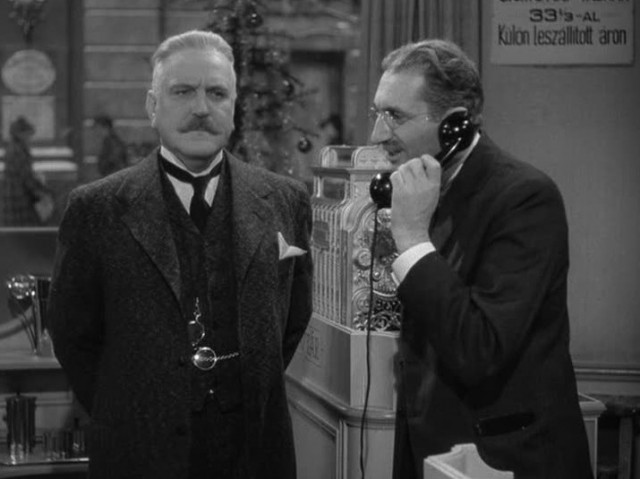
Mr. Matuschek (Frank Morgan) and Pirovitch (Felix Bressart) prepare for Christmas in THE SHOP AROUND THE CORNER
The Shop Around the Corner is based on Miklós László’s 1937 play, Parfumerie, and it very much has a claustrophobic feel, as events occur primarily in the small store. Stewart and Sullavan channel some of that Cary Grant / Irene Dunne magic as they go about their private and professional business, even if they don’t even make attempts at Hungarian accents. (Neither does Morgan, who gives one of his finest performances.) “There might be a lot we don’t know about each other. You know, people seldom go to the trouble of scratching the surface of things to find the inner truth,” Mr. Kralik says to Miss Novak, who replies, “Well, I really wouldn’t care to scratch your surface, Mr. Kralik, because I know exactly what I’d find. Instead of a heart, a handbag. Instead of a soul, a suitcase. And instead of an intellect, a cigarette lighter . . . which doesn’t work.” The central object in the shop is a cigarette box that plays the Eastern European folk song “Ochi Tchornya” every time it is opened; while Mr. Kralik thinks that smokers will tire of hearing the same tune over and over, Miss Novak convinces a customer that it is a candy box and that the repetition of the song will turn her away from opening the box again and again to eat more; meanwhile, Mr. Matuschek just wants to sell the darn things, delineating the three characters’ approach to life in general. Written by Samson Raphaelson, who adapted other plays and novels for Lubitsch, including The Smiling Lieutenant, Trouble in Paradise, and Heaven Can Wait, The Shop Around the Corner is a sweetly innocent film with just the right amount of edginess, a fun frolic through human nature and love, a fanciful confection set in the rococo interior of a shop selling little luxuries in a now-lost Hungary between the world wars. The story was also turned into the 1949 musical In the Good Old Summertime with Van Johnson and Judy Garland (Johnson also appeared in a 1945 radio version with Phyllis Thaxter) and Nora Ephron’s popular 1998 romantic comedy You’ve Got Mail, starring Tom Hanks and Meg Ryan, the latter playing a woman who runs a New York City bookstore called the Shop Around the Corner. (On New Year’s Eve, Film Forum will be pouring free champagne for the 7:00 and 9:15 shows.)
VIDEO OF THE DAY: “LEKHA DODI” BY JOSHUA NELSON AND THE KOSHER GOSPEL CHOIR
Who: Joshua Nelson and the Kosher Gospel Choir
What: Christmas Day concert melding Jewish lyrics with gospel music
Where: Museum of Jewish Heritage, 36 Battery Pl., 646-437-4202
When: Thursday, December 25, $35, 1:00 & 3:30
Why: Joshua Nelson is the Prince of Kosher Gospel, having recorded unique versions of “Adon Olam,” “Hine Ma Tov,” and “Lekha Dodi,” among other favorites; in addition, the museum is open, featuring such exhibits as “Against the Odds: American Jews and the Rescue of Europe’s Refugees, 1933-1945” and “A Town Known as Auschwitz: The Life and Death of a Jewish Community”
THE ELEPHANT MAN
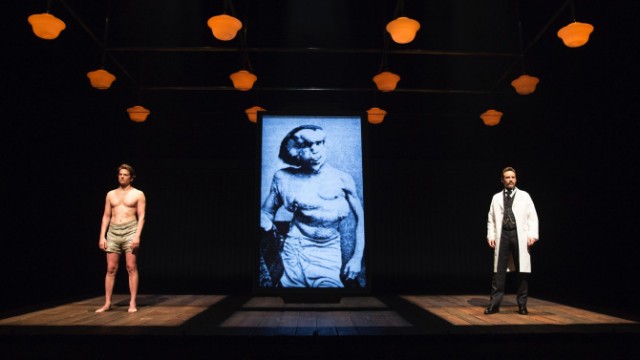
Bradley Cooper contorts himself into character as Dr. Frederick Treves (Alessandro Nivola) explains the physical deformations of the real John Merrick (photo by T. Charles Erickson)
Booth Theatre
222 West 45th St. between Broadway & Eighth Ave.
Through February 22, $79 – $169
www.elephantmanbroadway.com
www.shubert.nyc
The first time we see Bradley Cooper in director Scott Ellis’s strong revival of Bernard Pomerance’s 1977 Tony-winning hit, The Elephant Man, he is whole, perfectly formed, standing on the left side of the stage, wearing only a pair of shorts, a specimen on display for the audience. (There might be no applause at his initial appearance, but there is an audible gasp from appreciators of a fine male physique.) At stage right, Dr. Frederick Treves (Alessandro Nivola) is explaining the deformations that Cooper’s character, John Merrick, suffers from, pointing at enlarged photographs of the real Merrick, a nineteenth-century British resident of London. As Treves mentions each body part, Cooper contorts his shape, curling a hand, tightening a foot, twisting his mouth. Without makeup, he has turned himself into the sideshow spectacle known as the Elephant Man, and the transformation becomes complete when he speaks, grunts that soon flow into more eloquent language emerging from his misshapen mouth. In David Lynch’s 1980 film, an Oscar-nominated John Hurt played Merrick in full, disturbing makeup, but in the play Cooper — like such previous Merrick stage portrayers as the Tony-nominated Philip Anglim in the 1979 original, David Bowie as one of his replacements, and the Tony-nominated Billy Crudup in the 2002 Broadway revival — turns Merrick into a grotesque yet elegant and graceful character, a man whose inner beauty shines through as he goes from circus freak to a respected human being. But even as Merrick is accepted by high society, the medical community, and royalty, he still can’t escape being an attraction, eliciting a strange combination of revulsion and attraction, as Ellis (You Can’t Take It with You, The Mystery of Edwin Drood) cleverly uses the most basic theatricality to investigate what is revealed and what is hidden, changing scenes merely with curtains pulled across the stage by various minor characters.
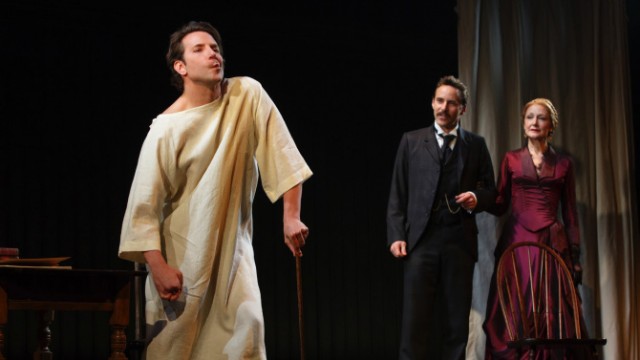
Dr. Frederick Treves (Alessandro Nivola) and Mrs. Kendal (Patricia Clarkson) befriend John Merrick (Bradley Cooper) in powerful Broadway revival (photo by T. Charles Erickson)
Despite a few treacly moments of oversentimentality, Pomerance’s play is a profound exploration of what makes us all different — as well as what makes us very much the same. Two-time Oscar nominee Cooper (American Hustle, Silver Linings Playbook) is extraordinary as Merrick (whose real first name was Joseph), a severely disfigured man who just wants to be “normal.” Nivola (The Winslow Boy, A Month in the Country) is outstanding as Treves, a doctor who sees Merrick as more than just a difficult case, becoming a kind of proud yet seriously overprotective parent. And Patricia Clarkson (The House of Blue Leaves, Eastern Standard) is lovely and charming as the lovely and charming Mrs. Kendal, a popular actress who is more than a little intrigued by Merrick, ready to reveal herself in unexpected ways. The excellent cast also includes two-time Tony nominee Anthony Heald (Anything Goes, Love! Valour! Compassion!) as Bishop Walsham How, who wants to make sure that Merrick receives the proper religious education; Henry Stram (Inherit the Wind, Titanic) as hospital head Carr Gomm, who realizes that taking care of Merrick can be good for business; and Tony nominee Kathryn Meisle (Tartuffe, Outside Mullingar) as both Princess Alexandra, who takes an interest in the oddity that is the Elephant Man, and Miss Sandwich, a caretaker who is horrified by Merrick. Timothy R. Mackabee’s set is suitably spare, consisting of just a table at one time, a bathtub at another, matching Cooper’s courageous soul- and body-baring performance. Once upon a time, people flocked to see the Elephant Man for all the wrong reasons; now they are flocking to see The Elephant Man for all the right ones.
VIDEO OF THE DAY: “CHRISTMAS (BABY PLEASE COME HOME)” BY DARLENE LOVE
Who: Darlene Love
What: A Darlene Love Christmas: Love for the Holidays
Where: B. B. King Blues Club & Grill, 237 West 42nd St. between Seventh & Eighth Aves., 212-997-4144
When: Friday, December 26, Saturday, December 27, and Friday, January 2, $45, 8:00
Why: The great Darlene Love performs holiday classics and more during multiple-show run in Times Square
LET THERE BE LIGHT — THE FILMS OF JOHN HUSTON: THERE WILL BE BLOOD
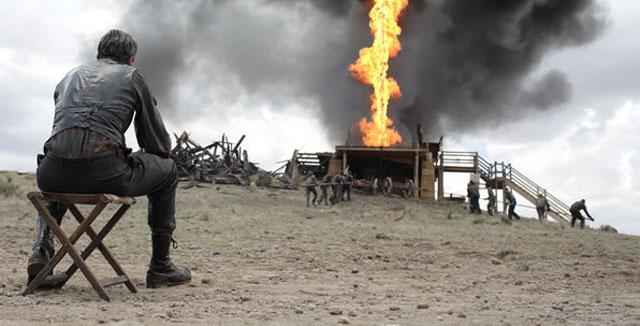
A desperate man (Daniel Day-Lewis) goes on a dark journey in Paul Thomas Anderson’s epic THERE WILL BE BLOOD
THERE WILL BE BLOOD (Paul Thomas Anderson, 2007)
Film Society of Lincoln Center, Walter Reade Theater
165 West 65th St. between Eighth Ave. & Broadway
Saturday, December 27, 5:45
Festival runs December 19 – January 11
212-875-5050
www.filmlinc.com
www.miramax.com
 In the fall of 2007, Paul Thomas Anderson talked to Directors Guild of America Quarterly about his latest film, There Will Be Blood, explaining how it was influenced by John Huston’s classic Western The Treasure of the Sierra Madre. “I was trying to find something that was one-hundred percent straightforward, old-fashioned storytelling. I definitely tried to mimic that approach. My natural instincts as a writer may be more scattered, so in an effort to be more traditional I used a book, just like they did. Sierra Madre is as direct as you can get — nothing clever, nothing structurally new or different — and I mean that as a high compliment. It’s harder than anything else to be completely straightforward.” There Will Be Blood has been called a lot of things since its release, but “traditional” and “completely straightforward” are probably not among them. But it does explain why Anderson’s film is one of only a handful of works not directed by Huston in the Film Society of Lincoln Center series “Let There Be Light: The Films of John Huston.” In There Will Be Blood, Daniel Day-Lewis, in remarkable voice (“I drink your milkshake!”), gives a spectacular, Oscar-winning performance as an independent oil man, absolutely embodying Daniel Plainview, a determined, desperate man digging for black gold in turn-of-the-century California. His first strike comes at a heavy price as he loses one of his men in a tragic accident, so he adopts the worker’s infant son, raising H.W. (Dillon Freasier) as his own. The growth of his company leads him to Little Boston, a small town that has oil just seeping out of its pores. But after not allowing Paul Sunday (Paul Dano), the charismatic preacher who runs the local Church of the Third Revelation, to say a prayer over the community’s first derrick, Plainview begins his descent into hell.
In the fall of 2007, Paul Thomas Anderson talked to Directors Guild of America Quarterly about his latest film, There Will Be Blood, explaining how it was influenced by John Huston’s classic Western The Treasure of the Sierra Madre. “I was trying to find something that was one-hundred percent straightforward, old-fashioned storytelling. I definitely tried to mimic that approach. My natural instincts as a writer may be more scattered, so in an effort to be more traditional I used a book, just like they did. Sierra Madre is as direct as you can get — nothing clever, nothing structurally new or different — and I mean that as a high compliment. It’s harder than anything else to be completely straightforward.” There Will Be Blood has been called a lot of things since its release, but “traditional” and “completely straightforward” are probably not among them. But it does explain why Anderson’s film is one of only a handful of works not directed by Huston in the Film Society of Lincoln Center series “Let There Be Light: The Films of John Huston.” In There Will Be Blood, Daniel Day-Lewis, in remarkable voice (“I drink your milkshake!”), gives a spectacular, Oscar-winning performance as an independent oil man, absolutely embodying Daniel Plainview, a determined, desperate man digging for black gold in turn-of-the-century California. His first strike comes at a heavy price as he loses one of his men in a tragic accident, so he adopts the worker’s infant son, raising H.W. (Dillon Freasier) as his own. The growth of his company leads him to Little Boston, a small town that has oil just seeping out of its pores. But after not allowing Paul Sunday (Paul Dano), the charismatic preacher who runs the local Church of the Third Revelation, to say a prayer over the community’s first derrick, Plainview begins his descent into hell.
Using Upton Sinclair’s 1927 novel Oil! as a starting point (and employing echoes of Orson Welles’s Citizen Kane and The Magnificent Ambersons in addition to the obvious reference, George Stevens’s classic 1956 oil flick, Giant), writer-director Anderson (Boogie Nights, The Master) has created a thrilling epic about greed, power, and corruption as well as jealousy, murder, and, above all, family, where oil gushes out of the ground with fire and brimstone. Robert Elswit’s beautiful, Oscar-winning cinematography is so gritty and realistic, audiences will be reaching for their faces to wipe the oil and blood off. The piercing, classically based score, composed by Radiohead guitarist Jonny Greenwood, builds to a mind-blowing crescendo by the end of the film — a finale that is likely to be much talked about and widely criticized. Filmed in the same location — Marfa, Texas — where Giant was set, There Will Be Blood is an unforgettable journey into the dark heart of one man’s soul. The film is screening December 27 at 5:45 at the Walter Reade Theater; “Let There Be Light: The Films of John Huston,” which continues through January 11, consists of forty films directed by the master, from The African Queen and Heaven Knows, Mr. Allison to The Life and Times of Judge Roy Bean and The List of Adrian Messenger, from The Red Badge of Courage and Victory to A Walk with Love and Death and The Kremlin Letter, in addition to a few movies Huston either appeared in (Chinatown, Tentacles!) or that demonstrate his lasting influence, as is the case with There Will Be Blood. The Treasure of the Sierra Madre will be shown December 23, 25, and 27.
A VERY JEWISH CHRISTMAS
Who: Marion Grodin, Jared Freid, Louis Katz, Sam Morril, and Chloé Hilliard
What: A Very Jewish Christmas
Where: Gotham Comedy Club, 208 West 23rd St. between Seventh & Eighth Aves., 212-367-9000
When: Wednesday, December 24, $25 (plus two-beverage minimum), 7:30 & 9:30
Why: Four Jewish comedians and one raised in a Hasidic community bring the laughs on Christmas Eve
